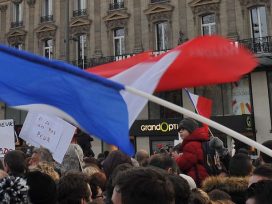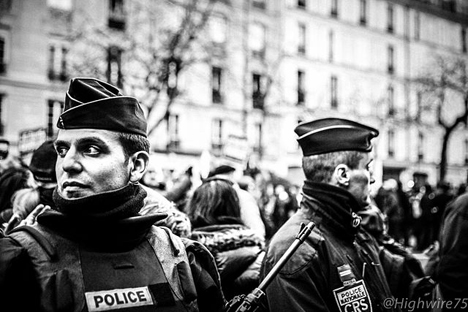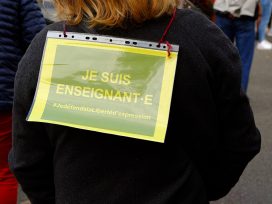
The defence of democracy in France must continue to be a republican discourse, not one of libertarian nationalism. Critics of ‘Islamo-leftism’ engage in the very same process of blame-shifting that they accuse their opponents of – sometimes rightly.
Parading under the banner of a common front for freedom, governments worldwide have embarked on a security clampdown whose political fallout could be more damaging than the threat it seeks to banish, writes Simon Davies.
If evidence was needed to show how the world has changed during the modern “era of terrorism”, you need look no further than recent events in the picturesque Kingdom of Denmark.
In the wake of the recent shootings in Copenhagen, government agencies are quickly turning this traditionally liberal national into a sort of post-9/11 terror environment. With almost no public engagement, police and security services have won new powers that should have sparked widespread debate.1 Instead, motivated by fear and uncertainty, the Danish public appears to have passively accepted the government’s actions.
The Denmark shootings were one in a string of “terrorism-related” incidents that have triggered national instability and disquiet in countries across the world. In this case, a gunman embarked on an assassination-style assault on a film director and a synagogue. Three people, including the suspected perpetrator, were killed and five police officers wounded during the incident.
Within days, Denmark’s security landscape had shifted. At the most obvious level, police were armed with high calibre and automated weaponry in public places. Meanwhile, the security services moved at speed to enhance their powers. These included proposals to allow the Danish Defence Intelligence Service to monitor Danish citizens abroad and a new anti-terror package for both the intelligence service and police.2
This trend was evident in Denmark even before the killings, with a decision to bring the government’s cybersecurity organisation “Govcert” within the ambit of the intelligence service and proposals to expand data retention. Parallel protections were left unattended by legislators. Indeed, for some months, there has been strong criticism of the declining standard of data protection in Denmark’s public institutions.
This pattern of events bears remarkable similarities to the consequences of similar tragedies in other nations.
The recent litany of “terrorism-related” episodes began the previous October in Ottawa. There, in what the Canadian police classified as a “terrorist attack”, a lone gunman shot and killed a soldier outside the federal parliament, before forcing his way into the building and engaging in a shootout with security officials. Since then, the Canadian authorities have been pressing for vastly expanded police and security powers.3
The following December, in Australia, a lone gunman held eighteen people hostage in a Sydney cafe, resulting in the death of three people. The Australian government responded with a package of security measures that observers believe to be the harshest in recent Australian history.4

Rally in support of the victims of the 2015attack, Paris, 11 January 2015. Photo: Guillaume Highwire. Source: Wikimedia
Then, in January 2015, a series of episodes in Paris (most notably the Charlie Hebdo attack) resulted in the death of twenty people. The legislative reaction of the French government was almost identical to that in Australia.
The response by all governments to these events follows a “blueprint”. That is, increased data sharing among agencies, greater discretionary powers for police, increased mass surveillance, warrantless targeted surveillance, increased retention of communications data and the rolling back of privacy protections. This is, in effect, a form of blanket policy laundering across borders.
Anyone concerned about the future of privacy protection should take careful note of the fallout from each of the attacks – but in particular the Charlie Hebdo shootings in France. The rapid chain of events in the weeks since then has triggered a domino effect of intrusive proposals and inflammatory rhetoric that could imperil the right to privacy for decades to come.
These privacy rollbacks are part of a comprehensive global assault on personal liberties, announced by the show of unity by world leaders at the Hebdo rally in Paris.
For the sake of context, it’s worth taking a moment to ask precisely why (and how) all those national leaders spontaneously appeared on the streets of Paris. Two months on, that question has never been answered. This is a critically important issue, especially because the media have almost universally bought the simplistic line that the leaders came together in a show of unity for free speech and brotherhood.
Some observers find this view implausible. Heads of state rarely converge in the cause of basic liberties – unless it’s as a pretext for conflict (consider the global hysteria surrounding the Thatcher-Reagan led “War on Drugs” in the 1980s5).
Leaders converge even less frequently in the name of freedom of speech – an issue on which most of those political tsars at the Paris rally have an appalling track record. And yet, in an unprecedented display of irony, more than forty of them suddenly appeared in that sensational photo-op near the front line of the rally.
I say “more than forty” because – remarkably – a definitive list isn’t readily discoverable. Few people in mainstream media view such a tally as relevant (other than the much-cited A-list of Hollande, Merkel, Cameron and Netanyahu).
Indeed it took a London School of Economics student, Daniel Wickham, to point out on Twitter the hypocrisy of France linking arms with the leaders of Egypt, Algeria, Russia, Tunisia et al in the name of freedom of speech.6
Still, the mood of the Paris event was unity – and woe betide anyone who sullied that fantasy moment. After all, the rally – and its generic conclave of world leaders – didn’t merely represent a new accord; it also symbolised hope for the progress of democracy and rights. At least, such was the celebratory tone of most speeches.
But, returning to the original point, why and how did this happen? And why at this moment in history?
It is possible that an informal new axis is being formed, ostensibly on the basis of protection of free expression and peace, but in reality motivated by the need for a show of greater unity in the “war” on terror.
A much less reported security summit involving those national leaders had immediately preceded the rally. Another followed in Washington DC. What all this activity indicates is that security agencies worldwide have agreed that the terror problem is likely to escalate. Or, at least, that it will become more random, uncertain and politically volatile and sensitive.
If the motivation of the Paris alliance was indeed to forge a new axis on the terror front, it’s already serving that mission. Before the dust had even settled from the rally, a string of world leaders had begun talking up the need for greater security and reduced privacy.
UK prime minister David Cameron immediately proposed measures to limit the use of encryption, while the Australian attorney general used the Paris events to justify greater powers for the police and security services. Attempts by Denmark to reintroduce data retention were bolstered while tightened security measures were being pushed in the Netherlands, Belgium and Austria.
Italy plans to introduce a spectrum of new provisions granting more wide-ranging powers to police7 while in Belgium, Ministers of defence and internal affairs are investigating a legislative amendment to expand the deployment of the army onto residential streets. Spain has introduced invasive and racist new security controls8 while the United States contemplates a range of intrusive measures.9
Police activity in suburbia appears increasingly common, with high profile operations being conducted against people who express subversive views. In Antwerp, police have raided several homes and arrested people alleged to have been spreading “hate messages on social media”.10
One consequence of the unity front in Paris is that police and security services – many of which are already unaccountable and out of control – will have licence to push the limits of acceptable conduct. This may accelerate the trend to urban militarisation and universal surveillance.
The International Business Times observed that the Paris attacks have created a profound effect on Europe’s political dynamics:
Across Europe, far-right and centre-right parties are using the terrorist murders to make the case that their countries must crack down on immigration and get tougher on terrorism. Such rhetoric could also prompt leftist parties in Europe to harden their stance on civil liberties amid attacks from the right about being soft on security as several countries head to the polls this year.11
Writing in the EU Observer, political philosopher Bleri Lleshi went further, expressing concern that Europe is heading for a crisis of fear:
Looking at the profile of Greece’s Golden Dawn voters or supporters of the anti-immigrant anti-EU UKIP, it appears that such parties are gaining popularity among socially excluded people.12
And thereby hangs the tail. One obvious fallout from any unified position by governments is the risk of triggering conflict with those who feel displaced or isolated by the consensus. A week after the Paris axis, a counter rally of 25,000 people took to the streets in Dresden to oppose the “Islamization” of Europe. This rally was roundly condemned by political leaders – a united front that, again, could nurture further hostility, isolation and possibly extremist action – and not from Islamic terrorists.
The unified front in Paris was clearly aimed at sending a message of solidarity against those who would aim to destroy peace and freedom. The risk of this gambit is that millions more people will feel anger and frustration as the screws tighten on their nationalist or racist movements. Security services may fear that this chain of repercussions could set neighbourhood against neighbourhood.
It is certainly the case that any overt display of solidarity on any side of the Islamic fence is triggering intense feelings of threat. In Denmark, for example, the laying of flowers at the spot where the suspected perpetrator had been killed sparked outrage, contributing to a record 3000 Mosque attendees at the ceremony for the perpetrator on the following Friday. This huge display of support for the alleged killer triggered further speculation of a widening divide in Danish society.13
While governments have reached accord on the security measures that should be pursued in response to such attacks, they are still divided on the question of when the label “terrorist” should be attached. In the early stages of the Sydney siege, police were anxious to push the message that the incident was the work of an insane “lone wolf” and not terrorist-related. The subsequent appearance of an ISIS flag put an end to that line of reasoning.
Governments have, however, worked collaboratively to promote provocative imagery and rhetoric in the arena of terrorism. This effort involves shifting arcane transitive verbs into popular language. Historically, the exercise usually signals impending fear and hatred.
The most prominent transitive verb is currently “radicalized”. In a very short time, the word has become part of the global political and media vocabulary – to such an extent that many people now see it as a self-evident truth.
To be radicalized is to have completed a process of radicalization, in the same way that the transitive verb poisoned is the outcome of the process of poisoning. Think of another transitive verb: “infected”.
When governments link nouns with transitive verbs they set in place a popular perception that society faces a sinister – often invisible – toxic element that creates an equally toxic outcome. So, radicalisation inevitably breeds radicals. And radicals, by inference, are a toxin.
Transitive verbs used in this way are extremely powerful linguistic devices, chiefly because they indicate a perverted outcome that requires emergency intervention. And, of course, radicalization has been the justification for a wide range of new police and security powers that test the limits of any liberal constitution.
One dangerous outcome of this trend is that it poisons the concept of radicalism, a noble element in all social and political reform. Government is slowly appropriating the idea of radicalism and turning it into something entirely destructive.
The problem with such linguistic trickery is that it gains a life of its own. McCarthyism showed that “communist infiltration” led to the toxin of subversion, which in turn created the demand for a test of loyalty that applied to swathes of the US population. In a similar vein, new UK legislation requires all public sector employees to report any perceived precursor of radicalisation, even among young children. This cannot end well.
The form of response to such attacks – increased data sharing among agencies, greater discretionary powers for police, increased mass surveillance, warrantless surveillance, increased retention of communications data and the rolling back of privacy protections – is a recent development. In the past, authorities have tended to pursue measures that were more targeted and directly relevant to the events in question.
Consider, for example, the massacres in Oklahoma, Dunblane and Port Arthur, which took place as recently as the 1990s. What emerged from those tragedies were directly relevant initiatives such as firearms licencing, regulation of explosives material and police reform. Each of these “reform centred” initiatives was tested on a foundation of evidence.
Mass surveillance has been a feature of security for many decades. Nowadays, however, it has come to be seen as practically the sole available response. Authorities complain that they need more information to detect potential perpetrators, and thus demand a reversal of the onus of proof of guilt.
All of which raises one of the enduring mysteries of the twenty-first century: why is it that in each of the terrorism-related incidents of 2014 and 2015, security and police authorities had detailed knowledge of the perpetrators? Indeed, why is it that they had equally detailed knowledge about the perpetrators of the Oklahoma, Dunblane and Port Arthur massacres, and yet failed to act?
Perhaps the true scandal at the heart of this mystery is not so much that the authorities failed to act (even where they had the power to do so), but that governments and parliaments failed to hold them to account.
Outside of the United States, where there is a least a token appreciation of security accountability, there is little or no interest in holding security agencies to account. In Britain, despite recent court decisions that ruled previous GCHQ surveillance unlawful,14 the government has refused to demand answers from its spy agencies. Secrecy and obfuscation has sat at the heart of British rule for centuries. After all, this is the country whose intelligence oversight commissioner only last year repeatedly refused to appear before parliament for questioning, forcing the Home Affairs committee to issue a summons against him.15
Of course spy chiefs will only respond to a firm hand by their political overlords, which in the UK and most of Europe have historically been lame. As recently as 2013, during an inquiry by the UK Parliament’s Intelligence and Security Committee, GCHQ Director Sir Iain Lobban was allowed to peddle the same party line that has been trotted out to Parliament by agencies for more than twenty years.
There can be no true security without accountability. The real battle that lies ahead for rights advocates – and indeed for anyone who cares about the integrity of public safety – is to force parliaments to act in a mature and responsible fashion and to ask the uncomfortable questions that will ensure genuine responses to threat.
Published 17 April 2015
Original in English
First published by Eurozine
© Simon Davies / Eurozine
PDF/PRINTSubscribe to know what’s worth thinking about.

The defence of democracy in France must continue to be a republican discourse, not one of libertarian nationalism. Critics of ‘Islamo-leftism’ engage in the very same process of blame-shifting that they accuse their opponents of – sometimes rightly.

Macron’s rhetoric on ‘Islamist separatism’ has inspired even more strident defences of laïcité on the right. Many see this hardening of attitudes as a final refutation of leftwing prevarications. But in reality, the debate on Islam in France remains confused at best.